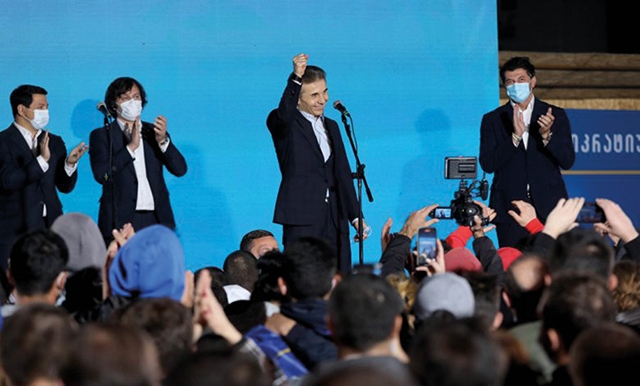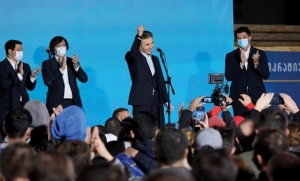Georgia’s 2020 Parliamentary Elections: Results & Reactions
On Saturday, October 31, one of the year's most important political events, the 2020 Parliamentary Elections, took place in Georgia, allowing voters to elect 150 members of parliament for a four-year term with a mixed model: 120 MPs elected through the proportional system, and 30 through the majoritarian system.
The Central Election Commission (CEC) reported that 3,526.023 voters were registered for the elections, of which 3,511.853 live in Georgia, and 14,170 are abroad.
A total of 3,657 polling stations were open across Georgia and 52 abroad.
The vote-counting procedure was launched after 20:00 following the completion of the polling process, however, the Central Election Commission announced the preliminary results later than expected, in the early hours of the following morning, reporting that the percentage distribution of votes at that time, based on the data collected from 1085 precincts, was the following:
Georgian Dream - Democratic Georgia - 54.72%, National Movement - Power is in Unity - 23.61, European Georgia - 3.99%, Alliance of Patriots - 3.32, Lelo - 2, 66%; Strategy Builder - 2.46%; Girchi - 1.91%; Labor Party - 0.92%.
“1085 polling stations have been counted. These are mainly polling stations that are small in the number of voters, and there are still a lot of protocols to be received, both from Tbilisi and big cities. It may change the results,” said Tamar Zhvania, Chairperson of the Central Election Commission of Georgia.
Shortly after, Georgian Dream declared its victory and started preparations for a celebration.
“We’ve won,” Prime Minister Giorgi Gakharia stated.
Prior to that, the public saw four different exit polls conducted by various TV Channels, showing ruling Georgian Dream party leading in the elections, but with different percentages. The above caused confusion among society, with the main question “Who won?” as both the opposition and the government started to celebrate a victory.
An exit poll conducted by Imedi TV showed Georgian Dream leading with 55% of votes, while the polls conducted by Rustavi 2 showed GD as having secured 52.26% of the votes cast. Opposition-minded channels Mtavari Arkhi and Formula TV consecutively showed the party winning, with 41% and 46% of votes respectively.
However, the opposition refused to accept defeat, and claimed that they had secured enough votes to form a coalition government. They added that “This is not the real picture.”
In order to protest the results, the opposition held a rally on November 1, first in front of Parliament and then in front of Bidzina Ivanishvili's Tbilisi residence, demanding an annulment of the election results.
Throughout the following day, the Central Election Commission gradually updated the data, counting more polling stations, but still showing the ruling party leading amid opposition protests in the streets. In the afternoon of November 2, the CEC published the final results and distribution of mandates.
Based on the results, voter turnout was 56% and 9 parties crossed the threshold for proportional representation, while a second round will be needed in 16 out of 30 majoritarian constituencies, including the eight constituencies of Tbilisi, on November 21. In all of them, a candidate from Georgian Dream will compete with an opposition candidate.
The final results of the CEC proportional list:
• Georgian Dream ruling party: 48.15% of votes (61 mandates)
• United National Movement - United Opposition election bloc: 27.14 % of votes (34 mandates)
• European Georgia: 3.78 % of votes (4 mandates + one undistributed mandate)
• Strategy Agmashenebeli: 3.15 % of votes (4 mandates)
• Lelo: 3.15% of votes (4 mandates)
• Alliance of Patriots: 3.14% of votes (4 mandates)
• Girchi: 2.89% of votes (3 mandates + one undistributed mandate)
• Aleko Elisashvili Citizens: 1.33% of votes (1 mandate + 1 undistributed mandate)
• Labor Party: 1% of votes (1 mandate)
However, the United National Movement and all other above-mentioned opposition parties are refusing to enter the Parliament of the 10th convocation or to recognize the election results. They claim that the election was rigged by the government and plan a mass protest rally outside the parliament building in Tbilisi on November 8 to express their distrust in the results and to demand an annulment.
“After the population saw that there were no elections in the country, nor even a sign of elections, of course, we, the united opposition, made the decision not to enter Parliament. Our demand remains unchanged: new elections in a free environment,” said Nika Melia, one of the leaders of the UNM.
Former President of Georgia Mikheil Saakashvili, the leader of the United National Movement, called on the public not to be afraid to join the scheduled rally despite the current epidemiological situation in the country. In his interview with TV Pirveli, the ex-president stated that the main thing at the rally scheduled for November 8 is the consolidation and unity of society, and the citizens should “not be afraid of anything, including the virus.”
On November 3, all Georgian opposition parties signed a joint statement renouncing their seats in Parliament until the elections are repeated.
Irakli Kobakhidze, Executive Secretary of the Georgian Dream party, told reporters that if a party refuses mandates, it should not receive any funding from the state, and that “it would be good to make such changes apparent in the legislation.”
“It would be logical that if a party refuses to enjoy the privileges granted to it by the people, it should not receive any other privileges related to the elections and mandates. This also includes state funding. In this regard, of course, it would be good to make relevant changes to the legislation, according to which, if a party treats the will of its own voters inappropriately and refuses mandates, it should be deprived of state funding. It would be natural, very logical,” Kobakhidze said.
In turn, the authorities denied the allegations of vote rigging and voter intimidation, claiming that the opposition simply doesn’t want to accept defeat and “is trying to gain power and attention through mass demonstrations.”
The elections were monitored by 70 teams of European diplomats. International partners assessed the country's parliamentary elections of October 31, welcoming Georgia's reforming of the electoral system and its having conducted the election smoothly despite the difficult circumstances of the COVID-19 pandemic. However, they do point out that there were certain shortcomings and violations that need to be addressed.
The OSCE Parliamentary Assembly stated that the “elections were competitive", while also reporting “pervasive allegations of pressure on voters and blurring of the line between the ruling party and the state.”
Observers critically assessed the alleged pressure on voters, intimidating atmosphere outside polling stations, the significantly unequal distribution of registered voters amongst the constituencies, issues with campaign financing, unaddressed ODIHR and CoE recommendations concerning certain areas in need of improvement, and more.
The United States Embassy in Georgia, commenting on the OSCE statement, said: “We call on all parties to address these deficiencies in advance of the second round and future elections. These efforts to corrupt the electoral process through voter intimidation, vote buying, interfering with ballot secrecy, blurring of party and official activities, and violence against election observers and journalists, while not sufficient to invalidate the results, continue to mar Georgia’s electoral process and are unacceptable.”
The EU Spokesperson for Foreign Affairs and Security Policy, Peter Stano, also commented on the Georgian parliamentary elections with a statement, noting that the elections were competitive and, overall, that fundamental freedoms were respected.
“The observers noted, however, that the conduct of the elections was impacted by pervasive allegations of pressure on voters and a blurring of the line between the ruling party and the state throughout the campaign and on Election Day, reducing public confidence in some aspects of the process,” the statement noted.
Based on the analysis issued by the National Democratic Institute (NDI), “Alleged irregularities in results protocols, widespread reports of potentially intimidating behavior in or around polling stations, delays in the publication of results and persistent perceptions of pre-election abuses of power detracted from notable improvements in the legal framework and administrative procedures for Georgia’s October 31, 2020 parliamentary elections.”
“As the results of the first round are finalized and the country heads to run-off elections on November 21, government leaders and election authorities will need to take extraordinary steps to address the concerns that have been raised and ensure public confidence in the overall process and final results,” the NDI concluded.
By Ana Dumbadze
GD celebrating. Source: GD Facebook Page












